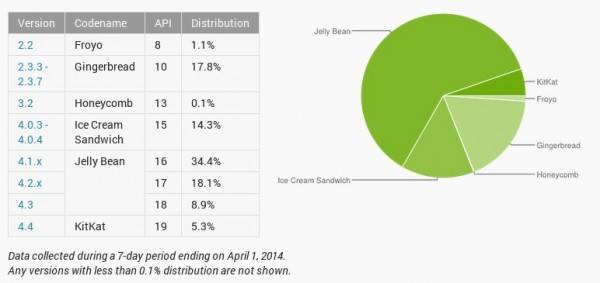
It’s that time of month again and looks like there’s some good news in the crusade against fragmentation. Based on Google’s collected numbers up to April 1 this year, Android 4.4 has reached 5.3 percent of the chart, more than double last month’s 2.5 percent.
This leap in numbers can perhaps be attributed to two factors. The first is, of course, the new devices being outed that are running Android 4.4. That trend has started early this year with a flood of new smartphones and tablets, though we expect them to come to a trickle for a few months before picking up pace again. The other factor is the ongoing rollout of Android 4.4 to existing devices. And not just the most current ones but sometimes even those more than a year old. We cannot also discount the effect of Android ROMs that also bring Android KitKat to even more and older devices.
Android 4.4 is largely seen as part of Google’s attempt to minimize fragmentation at least on the OS version level. Google has also been seen applying some rather strong-arm tactics to ensure that manufacturers deploy with the most recent Android versions instead of sticking to tried and tested but almost ancient ones. But we’re still missing one important part of that puzzle. Android 4.4 has been designed to work smoothly even on resource-constrained hardware, with as much as 512 MB of RAM. However, we are yet to low-end and budget devices adopt Android 4.4 and ditch using something as old as Gingerbread.

Speaking of Gingerbread, Android 2.3 has indeed gone down but only by 1.2 percent. Android 2.2 Froyo and Android 3.2 Honeycomb have managed to largely remain untouched. It is surprising to see Android 4.0 Ice Cream Sandwich actually grow by almost 1 percent. Similarly puzzling is the fact that Android 4.3 actually went down this time, while Android 4.2 went up, which might not bode well as far as pushing for the latest Android versions goes.
SOURCE: Google









